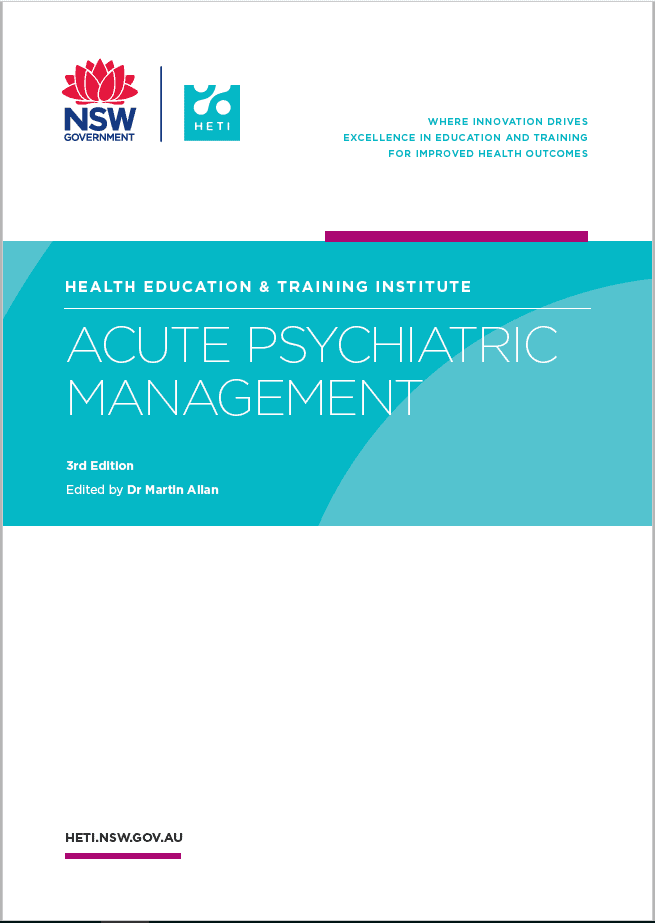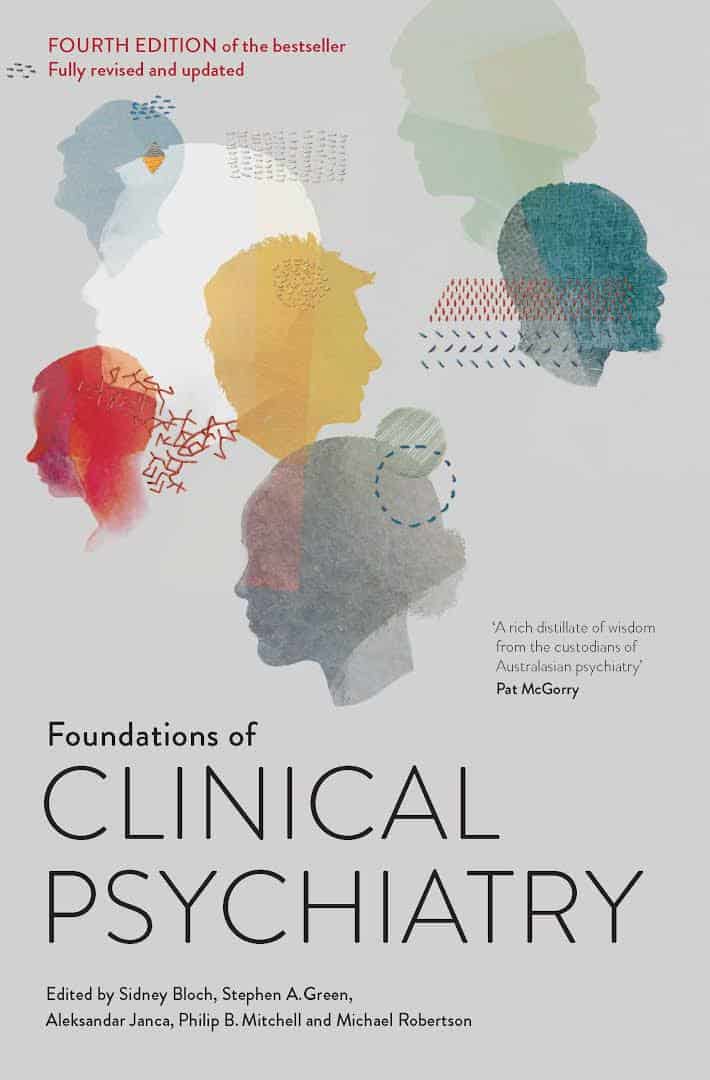Final Year Psychiatry Resources
A collection of helpful resources for early clinical learning about psychiatry and mental health

Final Year Psychiatry Syllabus
A week by week experiential and revision guide to ensure that you cover the key knowledge, skill and attitudinal requirements.
Download the recommended HETI ACUTE PSYCHIATRIAC MANAGEMENT GUIDE

Your Check List
- Review the Course Outline.
- Familiarise with Logbook.
- Review the End of Semester Assessment Process.
- Bookmark Meded.Help.
- Discuss your in term assessments with your supervisor.
- If you are struggling to complete the summative WBAs let a member of faculty know.
Weekly Syllabus
Select the Week you are up to and find out what you should be reviewing.
Week 0
Week 1
Week 2
Week 3
Week 4
Week 5
Week 6
Week 0
Mental health problems are common in society. The ultimate aim of this final year rotation in psychiatry is to prepare you to be able to effectively assess and manage the common problems that may be encountered by an intern and how to work as a member of a multidisciplinary team in helping people with mental illness.
As an added bonus we hope that your exposure to a multidisciplinary team aids you in the transition to intern where teamwork will be a key aspect of your role.
We recommend you work through these resources in order as you progress through your term.
We would like to thank the Hunter New England Psychiatry Trainees who helped contribute to these educational resources.
GO BACK 
Key Learning Tasks
1. Read How to Study Psychiatry2. Watch the Orientation Video!!3. Know your timetable and expectations4. Read the logbook5. Pick a textbook6. Practice MSE using video examples
Blog Posts to Review:
Week 1
Key Tasks this Week:
1. Induction & Orientation
2. Discuss logbook with team
3. Plan for all the WBAs
4. See and talk to patients
5. Revise Psychiatry History
6. Review Mood Disorders
7. Review Antidepressants
8. Review Psychotherapies
9. Start presenting MSEs to team members
10. Try the pharmacology eLearning module
11. See someone with Depression or Bipolar
There will be an orientation session at your respective clinical school site.
During your first week you will probably recall some of the previous lessons you have had in relation to psychiatry and mental health as well as some of the interactional skills training. These will come in handy as you progress during your term.
During this first week we suggest you become comfortable with interviewing people with mental health problems. Don’t worry too much about gathering information at this stage focus more on your style of questioning and eliciting key mental state findings.
There are a number of conditions in psychiatry. As an intern you will not be expected to know about all of these, however, there are some major categories that you should be familiar with.
We suggest you review mood disorders, noting that in the DSM-5 Depressive Disorders and Bipolar Disorders are now in separate categories.
Blog Posts to Review:
Asking Difficult Questions in Psychiatry
Week 2
Key Learning Tasks:
1. Review psychotic disorders
2. Review antipsychotics
3. Explain least restrictive care
4. Explain difference between mentally ill and mentally disordered
5. Use biopsychosocial framework
6. Make sure you have done one MiniCEX
Blog Posts to Review:
Week 3
Key Learning Tasks:
1. Review anxiety disorders
2. Interview a person with anxiety
3. Review anti-anxiety treatments
4. Revise relaxation techniques and mindfulness
5. Read up on child and adolescent psychiatry
6. Make sure you have presented a CbD
Blog Posts to Review:
Week 4
Key Learning Tasks:
1. Complete module on interviewing an Aboriginal person https://www.ranzcp.org/RANZCP/media/e…
2. See an Aboriginal person
3. Review Personality Disorders
4. Review PTSD & Impact of Trauma
5. Interview someone with PD or PTSD
6. Practice documentation
This week the focus is on development and culture within mental health. Please bear in mind that part of your examination will include an assessment of your understanding of the role of culture in mental illness. We will be utilising Aboriginal culture as our basis of understanding the role of culture in mental health.
You should also review development and personality, as well as the role of trauma and risk.
We are already halfway through our term and have covered quite a lot.
Blog Posts to Review:
Week 5
This is our final week of new learning. Next week will be a consolidation and preparation week.
The focus this week is on conditions that are more likely to be seen by interns in the general hospital or general practice setting.
Key Learning Tasks:
1. Make sure you are on track with your logbook
2. Sort out time for a supervisor report
3. Review cognitive testing and delirium
4. Decide your favourite bedside test
5. Review Eating Disorders
6. Review risk management
7. Practice handover
Blog Posts to Review:
The Ds of Cognitive Impairment
Week 6
Key Learning Tasks:
Hey, you made it!
Week 6 is a consolidation week.
So use the time to fill in any gaps.
And please take the time to fill in your surveys and give us some feedback.
Don’t forget to hand in your logbook.
Congratulations on completing your Psychiatry Rotation.
We do hope that you have had a good experience and an opportunity to prepare yourself for internship next year.
Don’t forget to get your supervisor forms and logbooks completed and returned.
For those of you interested in knowing a bit more about what its like to be a psychiatrist here are a few links:
Psychiatry at NSW Health Map My Health Career
RANZCP: Why Choose Psychiatry as a Career?
Hunter New England JMO Training Page
Blog Posts to (Re)Review:
Resources
Recommended Resources for your studies
VIDEOS
TEXTS

HETI Acute Psychiatric Management
Now in its 3rd edition. A great foundational free resource. Written by NSW authors.

Blog Posts
Other Relevant Blog Posts

